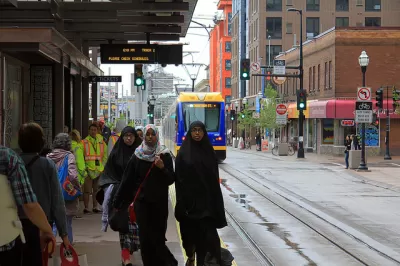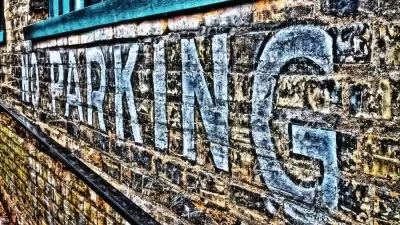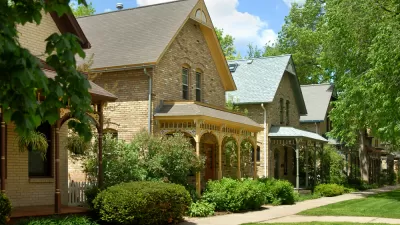As a first step in furthering goals set in the Minneapolis 2040 Comprehensive Plan, Minneapolis recently released the draft of a new ten-year transportation plan.

Miguel Otárola reports on the newly released draft of the Minneapolis Transportation Action Plan, a ten-year action plan to guide the future planning, design, and implementation of transportation projects in the city.
The guiding document, presented to the City Council’s transportation and public works committee, seeks to make other forms of transportation more accessible and appealing than driving. By doing so, city officials hope to reduce the number of vehicles on the road and lower greenhouse gas emissions that contribute to global warming.
Moreover:
A 2010 travel behavior study by the Metropolitan Council showed 68% of trips in the city were taken by car, a majority of which were by people driving alone. By 2030, transportation officials want to bring that down to 40%, according to the plan.
The draft of the plan clocks in at at 252 pages, and earned initial praise from most members of the City Council's Transportation and Public Works Committee. Councilmember Linea Palmisano, also a committee member, expressed skepticism that the plan could attain its ambitious goals.
As reported previously by Otárola, the transportation plan is intended to further the transportation goals set in the city's groundbreaking Minneapolis 2040 Comprehensive Plan.
FULL STORY: Minneapolis bets on walking, public transit to overtake driving by 2030

Alabama: Trump Terminates Settlements for Black Communities Harmed By Raw Sewage
Trump deemed the landmark civil rights agreement “illegal DEI and environmental justice policy.”

Planetizen Federal Action Tracker
A weekly monitor of how Trump’s orders and actions are impacting planners and planning in America.

The 120 Year Old Tiny Home Villages That Sheltered San Francisco’s Earthquake Refugees
More than a century ago, San Francisco mobilized to house thousands of residents displaced by the 1906 earthquake. Could their strategy offer a model for the present?

In Both Crashes and Crime, Public Transportation is Far Safer than Driving
Contrary to popular assumptions, public transportation has far lower crash and crime rates than automobile travel. For safer communities, improve and encourage transit travel.

Report: Zoning Reforms Should Complement Nashville’s Ambitious Transit Plan
Without reform, restrictive zoning codes will limit the impact of the city’s planned transit expansion and could exclude some of the residents who depend on transit the most.

Judge Orders Release of Frozen IRA, IIJA Funding
The decision is a victory for environmental groups who charged that freezing funds for critical infrastructure and disaster response programs caused “real and irreparable harm” to communities.
Urban Design for Planners 1: Software Tools
This six-course series explores essential urban design concepts using open source software and equips planners with the tools they need to participate fully in the urban design process.
Planning for Universal Design
Learn the tools for implementing Universal Design in planning regulations.
Clanton & Associates, Inc.
Jessamine County Fiscal Court
Institute for Housing and Urban Development Studies (IHS)
City of Grandview
Harvard GSD Executive Education
Toledo-Lucas County Plan Commissions
Salt Lake City
NYU Wagner Graduate School of Public Service





























